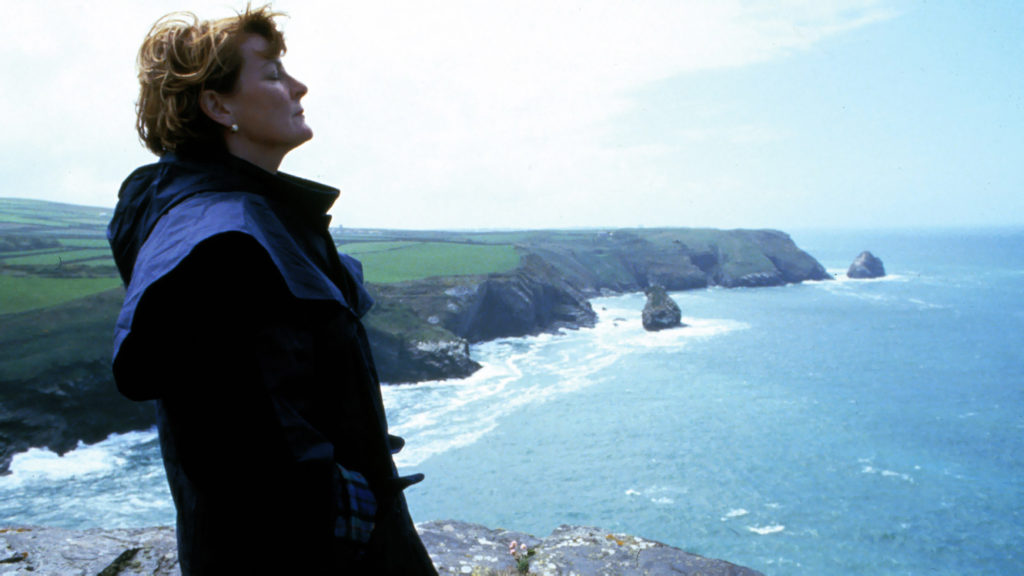Before becoming a TV personality, comedian Craig Ferguson starred in a movie called “Saving Grace,” released in 2000. The film, featuring a small cast and taking place in an idyllic English seaside village, is not perfect, but has entertaining moments for those who are fans of Ferguson’s comedy or those who enjoy English, indie-themed films. The inclusion of French actor Tchéky Karyo elevates it – even if the end losses the quaintness of the first and second act and goes over the top.
‘Grace’ in this movie is Grace Trevethyn (Brenda Blethyn), a woman liked by her small town whose husband has just committed suicide, leaving her with a large and unmanageable debt. Repo men take her possessions one-by-one, she has to lay off her gardner, Matthew (Ferguson), and it isn’t long until before surveyors are coming to her house to lay it off for auction.
The film has a smaller subplot involving Matthew and a few others (the town doctor, his girlfriend, and another friend Harvey) tending to a small plot of marijuana plants for personal use, which are doing poorly due to the clandestine nature of their growth. In repayment for laying Matthew off, Grace offers to help the plants, which ultimately leads to her and Matthew’s inevitable solution to her problem – grow marijuana for sale to pay off the hefty £300,000 mortgage on her house.
Where “Saving Grace” succeeds is in the light humor it treats the subject, and the quaintness of the village and the people who inhabit it. This is not a movie like “Half Baked” that is meant as a full-on homage to the pot-smoking lifestyle. There are some subtle references to both its benefits and its illegality, such as an interaction between Matthew and his girlfriend Nicky (Valerie Edmond, “One More Kiss”), who quips “It’s still illegal,” in response to Matthew’s dismissal of marijuana as a drug.
Everyone in this town seems to enjoy pot from time to time; but unlike less tasteful movies, there are no scenes of cars billowing smoke, or puerile jokes. Instead there is a subdued treatment. And one scene, as Grace tries a joint for the first time, is rightly hilarious. “Are you hungry?” Matthew asks. “God, I hadn’t thought of that,” she replies. “I’m ravenous.”

The actors in the film are all pleasing and carry the plot along. The film centers on Matthew, Grace, and Nicky, and all three are good here. Blethyn has been in some other, more serious films such as 2005’s “Pride & Prejudice” or 2007’s “Atonement,” but succeeds here due to her quirky yet serious delivery, and that fact that you really feel for Grace and her circumstances. She does what she does out of necessity, not greed.
“Saving Grace” is not a glorifying crime comedy, and it’s as endearing as it is due to the rapport Grace has with both Matthew and Nicky. Ferguson is very good here. While his current endeavor, “The Late Show with Craig Ferguson” is more commentary and politics, in “Saving Grace” he is toned down and relatable as an everyman. Matthew’s motive is also understandable – he lost his job, and doesn’t want to leave and be forced to go back home to Glasgow to find work. No one is a criminal mastermind here.
The set pieces and design are good, as is the cinematography. Camera shots detail the beautiful seaside village, especially the narrow roads and steep walkways that lead to the ocean. The Trevethyn residence is also a thing of wonder, large and regal.
 Where the film begins to break down is when the drug sale operation elevates, as Grace and Matthew go to London to “find a dealer.” The film’s beginning (about Matthew, Grace, and Nicky – and their relationship to each other) gives way to a goofy climax involving Hippies, dangerous drug dealers, and an ending back home that ends in a zany, unbelievable way. We are introduced to some pleasing players (such as Tchéky Karyo who plays drug dealer Jacques), but as hard as the movie tries, fails in recapturing the close-knit and indie feel of the its first hour.
Where the film begins to break down is when the drug sale operation elevates, as Grace and Matthew go to London to “find a dealer.” The film’s beginning (about Matthew, Grace, and Nicky – and their relationship to each other) gives way to a goofy climax involving Hippies, dangerous drug dealers, and an ending back home that ends in a zany, unbelievable way. We are introduced to some pleasing players (such as Tchéky Karyo who plays drug dealer Jacques), but as hard as the movie tries, fails in recapturing the close-knit and indie feel of the its first hour.
“Saving Grace” is not a bad movie, nor a great one. It has its moments, features nice acting, character development, and dialogue. That it grows too ambitious towards its end was probably inevitable, and doesn’t ruin the movie even if it does damage it. Overall, this is an overall enjoyable film that doesn’t offend anyone and is a decent way to spend 93 minutes.
– by Mark Ziobro


